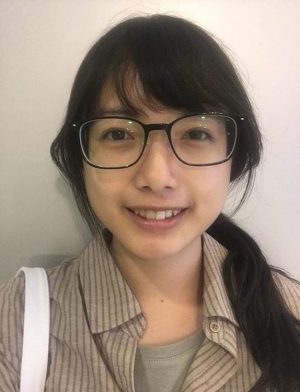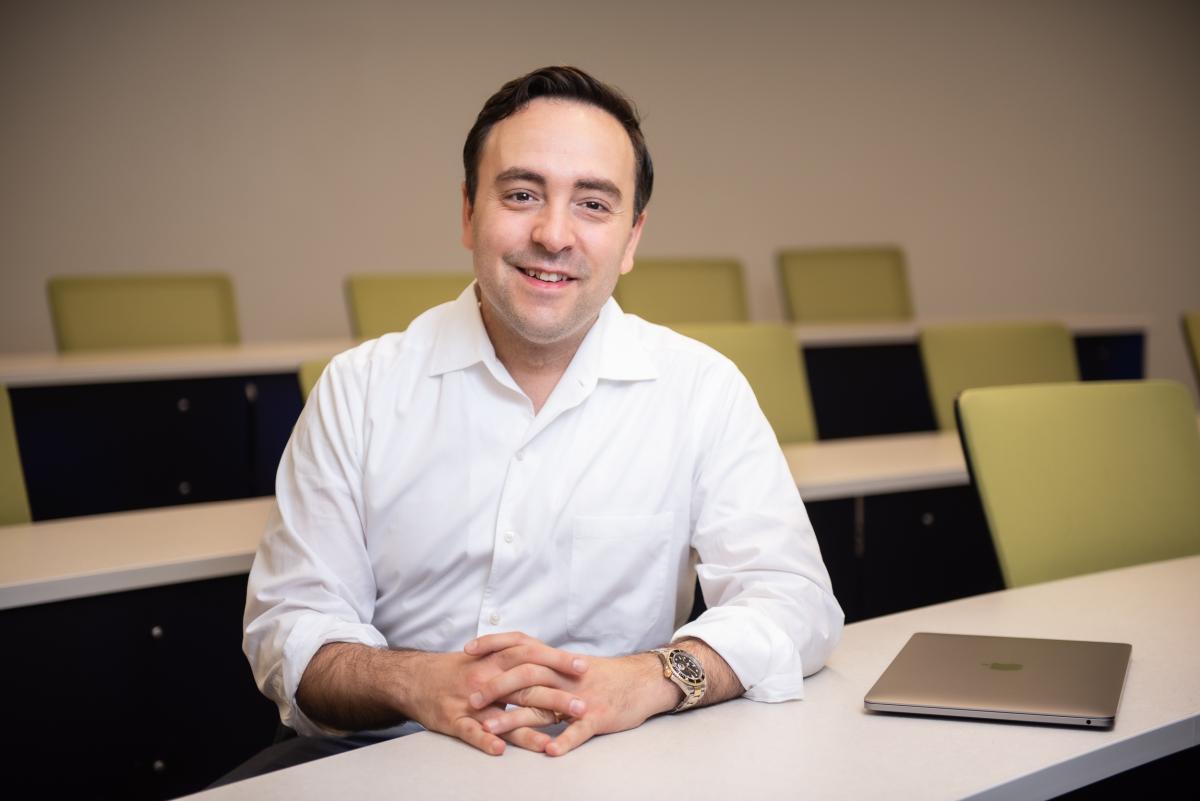- Date: November 18, 2021
Awarded to: Toshiaki Koike-Akino
MERL Contact: Toshiaki Koike-Akino
Research Areas: Communications, Electronic and Photonic Devices, Signal Processing
Brief - Toshiaki Koike-Akino's research activities in communications, error control coding and optical technologies at MERL have earned him election as a Fellow Member of Optica (formerly OSA), the foremost professional association in optics and photonics worldwide. Fellow membership in Optica is limited to no more than ten percent of the membership and is reserved for members who have served with distinction in the advancement of optics and photonics. Koike-Akino is one of 106 members from 24 countries in Optica’s 2022 Fellows Class, elected during the Board of Directors of Optica meeting held on 2nd of November, 2021.
“Congratulations to the 2022 Optica Fellows,” said 2021 President Connie Chang-Hasnain, University of California, Berkeley, USA. “These members exemplify what it means to be a leader in optics and photonics. Your election, by your peers, confirms the important contributions made within our field. Thank you for your dedication to Optica, and for advancing the science of light.”
Koike-Akino's elevation to Fellow is specifically “for outstanding and innovative contributions to R&D in enabling technologies for optical communications, including nonlinear equalizers, high-dimensional modulations, and FEC (Forward Error Correction),” said Meredith Smith, Director, Optica Awards and Honors Office. "Again, congratulations on joining this esteemed group of Optica members."
About Optica
Optica (formerly OSA) is dedicated to promoting the generation, application, archiving and dissemination of knowledge in optics and photonics worldwide. Founded in 1916, it is the leading organization for scientists, engineers, business professionals, students and others interested in the science of light. Optica’s renowned publications, meetings, online resources and in-person activities fuel discoveries, shape real-life applications and accelerate scientific, technical and educational achievement.
-
- Date: November 17, 2021
Awarded to: Elevators and Escalators Division of Mitsubishi Electric US, Inc.
MERL Contacts: Daniel N. Nikovski; William S. Yerazunis
Research Areas: Data Analytics, Machine Learning, Signal Processing
Brief - The Elevators and Escalators Division of Mitsubishi Electric US, Inc. has been recognized as a 2022 CES® Innovation Awards honoree for its new PureRide™ Touchless Control for elevators, jointly developed with MERL. Sponsored by the Consumer Technology Association (CTA), the CES Innovation Awards is the largest and most influential technology event in the world. PureRide™ Touchless Control provides a simple, no-touch product that enables users to call an elevator and designate a destination floor by placing a hand or finger over a sensor. MERL initiated the development of PureRide™ in the first weeks of the COVID-19 pandemic by proposing the use of infra-red sensors for operating elevator call buttons, and participated actively in its rapid implementation and commercialization, resulting in a first customer installation in October of 2020.
-
- Date: November 11, 2021
Awarded to: Niklas Smedemark-Margulies, Toshiaki Koike-Akino, Ye Wang, Deniz Erdogmus
MERL Contacts: Toshiaki Koike-Akino; Ye Wang
Research Areas: Artificial Intelligence, Signal Processing, Human-Computer Interaction
Brief - The MERL Signal Processing group achieved first place in the cross-subject transfer learning task and fourth place overall in the NeurIPS 2021 BEETL AI Challenge for EEG Transfer Learning. The team included Niklas Smedemark-Margulies (intern from Northeastern University), Toshiaki Koike-Akino, Ye Wang, and Prof. Deniz Erdogmus (Northeastern University). The challenge addresses two types of transfer learning tasks for EEG Biosignals: a homogeneous transfer learning task for cross-subject domain adaptation; and a heterogeneous transfer learning task for cross-data domain adaptation. There were 110+ registered teams in this competition, MERL ranked 1st in the homogeneous transfer learning task, 7th place in the heterogeneous transfer learning task, and 4th place for the combined overall score. For the homogeneous transfer learning task, MERL developed a new pre-shot learning framework based on feature disentanglement techniques for robustness against inter-subject variation to enable calibration-free brain-computer interfaces (BCI). MERL is invited to present our pre-shot learning technique at the NeurIPS 2021 workshop.
-
- Date & Time: Tuesday, November 16, 2021; 11:00 AM EST
Speaker: Thomas Schön, Uppsala University
Research Areas: Dynamical Systems, Machine Learning
Abstract  While deep learning-based classification is generally addressed using standardized approaches, this is really not the case when it comes to the study of regression problems. There are currently several different approaches used for regression and there is still room for innovation. We have developed a general deep regression method with a clear probabilistic interpretation. The basic building block in our construction is an energy-based model of the conditional output density p(y|x), where we use a deep neural network to predict the un-normalized density from input-output pairs (x, y). Such a construction is also commonly referred to as an implicit representation. The resulting learning problem is challenging and we offer some insights on how to deal with it. We show good performance on several computer vision regression tasks, system identification problems and 3D object detection using laser data.
While deep learning-based classification is generally addressed using standardized approaches, this is really not the case when it comes to the study of regression problems. There are currently several different approaches used for regression and there is still room for innovation. We have developed a general deep regression method with a clear probabilistic interpretation. The basic building block in our construction is an energy-based model of the conditional output density p(y|x), where we use a deep neural network to predict the un-normalized density from input-output pairs (x, y). Such a construction is also commonly referred to as an implicit representation. The resulting learning problem is challenging and we offer some insights on how to deal with it. We show good performance on several computer vision regression tasks, system identification problems and 3D object detection using laser data.
-
- Date & Time: Thursday, December 9, 2021; 100pm-5:30pm (EST)
Location: Virtual Event
Research Areas: Applied Physics, Artificial Intelligence, Communications, Computational Sensing, Computer Vision, Control, Data Analytics, Dynamical Systems, Electric Systems, Electronic and Photonic Devices, Machine Learning, Multi-Physical Modeling, Optimization, Robotics, Signal Processing, Speech & Audio, Digital Video, Human-Computer Interaction, Information Security
Brief - Mitsubishi Electric Research Laboratories cordially invites you to join our Virtual Open House, on December 9, 2021, 1:00pm - 5:30pm (EST).
The event will feature keynotes, live sessions, research area booths, and time for open interactions with our researchers. Join us to learn more about who we are, what we do, and discuss our internship and employment opportunities.
Registration: https://mailchi.mp/merl/merlvoh2021
-
- Date & Time: Tuesday, November 9, 2021; 1:00 PM EST
Speaker: Prof. Marco Di Renzo, CNRS & Paris-Saclay University
Research Areas: Communications, Electronic and Photonic Devices, Signal Processing
Abstract  A Reconfigurable Intelligent Surface (RIS) is a planar structure that is engineered to have properties that enable the dynamic control of the electromagnetic waves. In wireless communications and networks, RISs are an emerging technology for realizing programmable and reconfigurable wireless propagation environments through nearly passive and tunable signal transformations. RIS-assisted programmable wireless environments are a multidisciplinary research endeavor. This presentation is aimed to report the latest research advances on modeling, analyzing, and optimizing RISs for wireless communications with focus on electromagnetically consistent models, analytical frameworks, and optimization algorithms.
A Reconfigurable Intelligent Surface (RIS) is a planar structure that is engineered to have properties that enable the dynamic control of the electromagnetic waves. In wireless communications and networks, RISs are an emerging technology for realizing programmable and reconfigurable wireless propagation environments through nearly passive and tunable signal transformations. RIS-assisted programmable wireless environments are a multidisciplinary research endeavor. This presentation is aimed to report the latest research advances on modeling, analyzing, and optimizing RISs for wireless communications with focus on electromagnetically consistent models, analytical frameworks, and optimization algorithms.
-
- Date: December 10, 2021
Research Areas: Electronic and Photonic Devices, Machine Learning
Brief - MERL's Researcher Dr. Rui Ma is the keynote speaker for Electronic Design Innovation CON (EDICON2021) to be held in Shenzhen, China from Dec. 9-10, with a talk titled "Digitization and intelligence: unlocking the innovation of future radios". The conference brings together international researchers from academics, industry, and media distribution to share perspectives on the technology needed and being developed for the next generation of communication.
-
- Date: November 4, 2021
MERL Contact: Anthony Vetro Brief - Anthony Vetro has been elected as a Member-at-Large to serve on the Board of Governors of the IEEE Signal Processing Society (SPS). He will serve a three-year term from January 2022 until December 2024.
The Board of Governors (BoG) is the governing body that oversees the activities of the IEEE Signal Processing Society. The SPS BoG has the responsibility of establishing and implementing policy, and receiving reports from its standing boards and committees. Members-at-Large represent the member view point in the Board decision-making. They typically review, discuss, and act upon a wide range of items affecting the actions, activities, and health of the Society.
-
- Date & Time: Tuesday, November 2, 2021; 1:00 PM EST
Speaker: Dr. Hsiao-Yu (Fish) Tung, MIT BCS
Research Areas: Artificial Intelligence, Computer Vision, Machine Learning, Robotics
Abstract  Current state-of-the-art CNNs can localize and name objects in internet photos, yet, they miss the basic knowledge that a two-year-old toddler has possessed: objects persist over time despite changes in the observer’s viewpoint or during cross-object occlusions; objects have 3D extent; solid objects do not pass through each other. In this talk, I will introduce neural architectures that learn to parse video streams of a static scene into world-centric 3D feature maps by disentangling camera motion from scene appearance. I will show the proposed architectures learn object permanence, can imagine RGB views from novel viewpoints in truly novel scenes, can conduct basic spatial reasoning and planning, can infer affordability in sentences, and can learn geometry-aware 3D concepts that allow pose-aware object recognition to happen with weak/sparse labels. Our experiments suggest that the proposed architectures are essential for the models to generalize across objects and locations, and it overcomes many limitations of 2D CNNs. I will show how we can use the proposed 3D representations to build machine perception and physical understanding more close to humans.
Current state-of-the-art CNNs can localize and name objects in internet photos, yet, they miss the basic knowledge that a two-year-old toddler has possessed: objects persist over time despite changes in the observer’s viewpoint or during cross-object occlusions; objects have 3D extent; solid objects do not pass through each other. In this talk, I will introduce neural architectures that learn to parse video streams of a static scene into world-centric 3D feature maps by disentangling camera motion from scene appearance. I will show the proposed architectures learn object permanence, can imagine RGB views from novel viewpoints in truly novel scenes, can conduct basic spatial reasoning and planning, can infer affordability in sentences, and can learn geometry-aware 3D concepts that allow pose-aware object recognition to happen with weak/sparse labels. Our experiments suggest that the proposed architectures are essential for the models to generalize across objects and locations, and it overcomes many limitations of 2D CNNs. I will show how we can use the proposed 3D representations to build machine perception and physical understanding more close to humans.
-
- Date: October 21, 2021
Where: Université de Lorraine, France
Research Areas: Artificial Intelligence, Control, Machine Learning, Multi-Physical Modeling, Optimization
Brief - Ankush Chakrabarty (RS, Multiphysical Systems Team) gave an invited talk on `Bayesian-Optimized Estimation and Control for Buildings and HVAC' at the Research Center for Automatic Control (CRAN) in the University of Lorraine in France. The talk presented recent MERL research on probabilistic machine learning for set-point optimization and calibration of digital twins for building energy systems.
-
- Date: October 18, 2021
Awarded to: Daniel Nikovski
MERL Contact: Daniel N. Nikovski
Research Areas: Artificial Intelligence, Machine Learning
Brief - Daniel Nikovski, Group Manager of MERL's Data Analytics group, has received an Outstanding Reviewer Award from the 2021 conference on Neural Information Processing Systems (NeurIPS'21). NeurIPS is the world's premier conference on neural networks and related technologies.
-
- Date & Time: Tuesday, October 12, 2021; 1:00 PM EST
Speaker: Prof. Greg Ongie, Marquette University
MERL Host: Hassan Mansour
Research Areas: Computational Sensing, Machine Learning, Signal Processing
Abstract  Deep learning is emerging as powerful tool to solve challenging inverse problems in computational imaging, including basic image restoration tasks like denoising and deblurring, as well as image reconstruction problems in medical imaging. This talk will give an overview of the state-of-the-art supervised learning techniques in this area and discuss two recent innovations: deep equilibrium architectures, which allows one to train an effectively infinite-depth reconstruction network; and model adaptation methods, that allow one to adapt a pre-trained reconstruction network to changes in the imaging forward model at test time.
Deep learning is emerging as powerful tool to solve challenging inverse problems in computational imaging, including basic image restoration tasks like denoising and deblurring, as well as image reconstruction problems in medical imaging. This talk will give an overview of the state-of-the-art supervised learning techniques in this area and discuss two recent innovations: deep equilibrium architectures, which allows one to train an effectively infinite-depth reconstruction network; and model adaptation methods, that allow one to adapt a pre-trained reconstruction network to changes in the imaging forward model at test time.
-
- Date: September 17, 2021 - October 31, 2021
MERL Contact: Diego Romeres
Research Areas: Artificial Intelligence, Control, Data Analytics, Dynamical Systems, Optimization, Robotics
Brief - Diego Romeres, a Principal Research Scientist in MERL's Data Analytics group, is serving as an Associate Editor (AE) for the IEEE International Conference on Robotics and Automation (ICRA) 2022.
-
- Date & Time: Tuesday, September 28, 2021; 1:00 PM EST
Speaker: Dr. Ruohan Gao, Stanford University
MERL Host: Gordon Wichern
Research Areas: Computer Vision, Machine Learning, Speech & Audio
Abstract  While computer vision has made significant progress by "looking" — detecting objects, actions, or people based on their appearance — it often does not listen. Yet cognitive science tells us that perception develops by making use of all our senses without intensive supervision. Towards this goal, in this talk I will present my research on audio-visual learning — We disentangle object sounds from unlabeled video, use audio as an efficient preview for action recognition in untrimmed video, decode the monaural soundtrack into its binaural counterpart by injecting visual spatial information, and use echoes to interact with the environment for spatial image representation learning. Together, these are steps towards multimodal understanding of the visual world, where audio serves as both the semantic and spatial signals. In the end, I will also briefly talk about our latest work on multisensory learning for robotics.
While computer vision has made significant progress by "looking" — detecting objects, actions, or people based on their appearance — it often does not listen. Yet cognitive science tells us that perception develops by making use of all our senses without intensive supervision. Towards this goal, in this talk I will present my research on audio-visual learning — We disentangle object sounds from unlabeled video, use audio as an efficient preview for action recognition in untrimmed video, decode the monaural soundtrack into its binaural counterpart by injecting visual spatial information, and use echoes to interact with the environment for spatial image representation learning. Together, these are steps towards multimodal understanding of the visual world, where audio serves as both the semantic and spatial signals. In the end, I will also briefly talk about our latest work on multisensory learning for robotics.
-
- Date: May 16, 2022 - May 20, 2022
Where: 2022 IEEE ICC
Research Areas: Communications, Signal Processing
Brief - Kyeong Jin Kim, a Senior Principal Research Scientist in the Signal Processing Group, organizes a workshop in 2022 IEEE International Conference on Communications (ICC). The workshop is titled, "Industrial Private 5G-and-beyond Wireless Networks," and aims to bring researchers for technical discussion on fundamental and practically relevant questions to many emerging challenges in industrial private wireless networks. This workshop is also being organized with the help of other researchers from Huawei Technology, Princeton University, Aalborg University, Jinan University, and South China University of Technology. IEEE ICC is one of two IEEE Communications Society's flagship conferences.
-
- Date & Time: Tuesday, September 14, 2021; 1:00 PM EST
Speaker: Prof. David Bergman, University of Connecticut
MERL Host: Arvind Raghunathan
Research Areas: Data Analytics, Machine Learning, Optimization
Abstract  The integration of machine learning and optimization opens the door to new modeling paradigms that have already proven successful across a broad range of industries. Sports betting is a particularly exciting application area, where recent advances in both analytics and optimization can provide a lucrative edge. In this talk we will discuss three algorithmic sports betting games where combinations of machine learning and optimization have netted me significant winnings.
The integration of machine learning and optimization opens the door to new modeling paradigms that have already proven successful across a broad range of industries. Sports betting is a particularly exciting application area, where recent advances in both analytics and optimization can provide a lucrative edge. In this talk we will discuss three algorithmic sports betting games where combinations of machine learning and optimization have netted me significant winnings.
-
- Date: September 7, 2021
MERL Contact: Anoop Cherian
Research Areas: Artificial Intelligence, Computer Vision, Machine Learning
Brief - Anoop Cherian, a Principal Research Scientist in MERL's Computer Vision group, gave an invited virtual talk on "InSeGAN: An Unsupervised Approach to Identical Instance Segmentation" at the Visual Information Laboratory of University of Bristol, UK. The talk described a new approach to segmenting varied appearances of nearly identical 3D objects in depth images. More details of the talk can be found in the following paper https://arxiv.org/abs/2108.13865, which will be presented at the International Conference on Computer Vision (ICCV'21).
-
- Date: September 22, 2021
Where: The Alan Turing Institute
Research Area: Dynamical Systems
Brief - Mouhacine Benosman will give a talk about merging physical models with data-driven and machine learning methods for real-world application. The talk will include results about data-driven auto-tuning for feedback controllers with application to power amplifiers, extremum seeking and Gaussian processes for reduction/estimation of fluid dynamics models with application to indoor airflow modeling, and safe reinforcement learning for safety-critical and Sim2Real applications.
-
- Date: August 12, 2021
MERL Contact: Anthony Vetro
Research Areas: Artificial Intelligence, Computer Vision, Control, Dynamical Systems, Machine Learning, Optimization, Robotics
Brief - Anthony Vetro gave a keynote at the inaugural IEEE Conference on Autonomous Systems (ICAS), which was held virtually from August 11-13, 2021. The talk focused on challenges and recent progress in the area of robotic manipulation. The conference is sponsored by IEEE Signal Processing Society (SPS) through the SPS Autonomous Systems Initiative.
Abstract: Human-level manipulation continues to be beyond the capabilities of today’s robotic systems. Not only do current industrial robots require significant time to program a specific task, but they lack the flexibility to generalize to other tasks and be robust to changes in the environment. While collaborative robots help to reduce programming effort and improve the user interface, they still fall short on generalization and robustness. This talk will highlight recent advances in a number of key areas to improve the manipulation capabilities of autonomous robots, including methods to accurately model the dynamics of the robot and contact forces, sensors and signal processing algorithms to provide improved perception, optimization-based decision-making and control techniques, as well as new methods of interactivity to accelerate and enhance robot learning.
-
- Date: August 5, 2021
MERL Contact: Petros T. Boufounos
Research Areas: Computational Sensing, Signal Processing
Brief - MERL's Distinguished Researcher Dr. Petros Boufounos is the keynote speaker for the Center for Advanced Signal and Image Sciences (CASIS) 25th Annual Workshop on Aug. 5, 2021, with talk titled, "The Computational Sensing Revolution in Array Processing."
-
- Date: July 26, 2021
MERL Contacts: Petros T. Boufounos; Jonathan Le Roux; Philip V. Orlik; Anthony Vetro
Research Areas: Signal Processing, Speech & Audio
Brief - IEEE has announced that the recipients of the 2022 IEEE James L. Flanagan Speech and Audio Processing Award will be Hervé Bourlard (EPFL/Idiap Research Institute) and Nelson Morgan (ICSI), "For contributions to neural networks for statistical speech recognition," and the recipient of the 2022 IEEE Fourier Award for Signal Processing will be Ali Sayed (EPFL), "For contributions to the theory and practice of adaptive signal processing." More details about the contributions of Prof. Bourlard and Prof. Morgan can be found in the announcements by ICSI and EPFL, and those of Prof. Sayed in EPFL's announcement. Mitsubishi Electric Research Laboratories (MERL) has recently become the new sponsor of these two prestigious awards, and extends our warmest congratulations to all of the 2022 award recipients.
The IEEE Board of Directors established the IEEE James L. Flanagan Speech and Audio Processing Award in 2002 for outstanding contributions to the advancement of speech and/or audio signal processing, while the IEEE Fourier Award for Signal Processing was established in 2012 for outstanding contribution to the advancement of signal processing, other than in the areas of speech and audio processing. Both awards have recognized the contributions of some of the most renowned pioneers and leaders in their respective fields. MERL is proud to support the recognition of outstanding contributions to the signal processing field through its sponsorship of these awards.
-
- Date: July 13, 2021
Where: Robotics: Science and Systems
MERL Contacts: Siddarth Jain; Diego Romeres
Research Areas: Artificial Intelligence, Machine Learning, Robotics
Brief - MERL researchers Diego Romeres, Devesh Jha, and Siddarth Jain together with research groups at MIT, NVIDIA, NIST, TUM, Google DeepMind, ETH Zurich, Google AI, and UMASS Lowell organized a workshop at the Robotics: Science and Systems 2021 conference. The workshop was on "Advancing Artificial Intelligence and Manipulation for Robotics: Understanding Gaps, Industry and Academic Perspectives, and Community Building". The workshop had a list of excellent speakers both from academia and industry. Recording of the talks and of the panel discussion can be found in the link below.
-
- Date: July 14, 2021
Research Area: Dynamical Systems
Brief - Mouhacine Benosman co-edits a special issue on Extremum Seeking Control in the International Journal of Adaptive Control and Signal Processing.
The issue contains some of the newest theoretical developments on continuous-time optimizers, known as extremum seekers, with applications ranging from microalgae cultivation control to heating and ventilation systems optimization.
The special issue is available at:
https://onlinelibrary.wiley.com/toc/10991115/current
-
- Date: July 9, 2021
MERL Contacts: Petros T. Boufounos; Jonathan Le Roux; Philip V. Orlik; Anthony Vetro
Research Areas: Signal Processing, Speech & Audio
Brief - Mitsubishi Electric Research Laboratories (MERL) has become the new sponsor of two prestigious IEEE Technical Field Awards in Signal Processing, the IEEE James L. Flanagan Speech and Audio Processing Award and the IEEE Fourier Award for Signal Processing, for the years 2022-2031. "MERL is proud to support the recognition of outstanding contributions to signal processing by sponsoring both the IEEE James L. Flanagan Speech and Audio Processing Award and the IEEE Fourier Award for Signal Processing. These awards celebrate the creativity and innovation in the field that touch many aspects of our lives and drive our society forward" said Dr. Anthony Vetro, VP and Director at MERL.
The IEEE Board of Directors established the IEEE James L. Flanagan Speech and Audio Processing Award in 2002 for outstanding contributions to the advancement of speech and/or audio signal processing, while the IEEE Fourier Award for Signal Processing was established in 2012 for outstanding contribution to the advancement of signal processing, other than in the areas of speech and audio processing. Both awards have since recognized the contributions of some of the most renowned pioneers and leaders in their respective fields.
By underwriting these IEEE Technical Field Awards, MERL continues to make a mark by supporting the advancement of technology that makes lasting changes in the world.
-
- Date: July 12, 2021
Research Areas: Control, Dynamical Systems, Optimization
Brief - MERL researcher Rien Quirynen will present work in collaboration with Karl Berntorp on "Uncertainty Propagation by Linear Regression Kalman Filters for Stochastic Nonlinear MPC" as a keynote speaker at the 7th IFAC Conference on Nonlinear Model Predictive Control 2021 on July, 12th. The paper is 1 out of 5 keynote presentations chosen among more than 50 accepted papers at the conference. An abstract of the talk can be found in the link below.
-
 While deep learning-based classification is generally addressed using standardized approaches, this is really not the case when it comes to the study of regression problems. There are currently several different approaches used for regression and there is still room for innovation. We have developed a general deep regression method with a clear probabilistic interpretation. The basic building block in our construction is an energy-based model of the conditional output density p(y|x), where we use a deep neural network to predict the un-normalized density from input-output pairs (x, y). Such a construction is also commonly referred to as an implicit representation. The resulting learning problem is challenging and we offer some insights on how to deal with it. We show good performance on several computer vision regression tasks, system identification problems and 3D object detection using laser data.
While deep learning-based classification is generally addressed using standardized approaches, this is really not the case when it comes to the study of regression problems. There are currently several different approaches used for regression and there is still room for innovation. We have developed a general deep regression method with a clear probabilistic interpretation. The basic building block in our construction is an energy-based model of the conditional output density p(y|x), where we use a deep neural network to predict the un-normalized density from input-output pairs (x, y). Such a construction is also commonly referred to as an implicit representation. The resulting learning problem is challenging and we offer some insights on how to deal with it. We show good performance on several computer vision regression tasks, system identification problems and 3D object detection using laser data. A Reconfigurable Intelligent Surface (RIS) is a planar structure that is engineered to have properties that enable the dynamic control of the electromagnetic waves. In wireless communications and networks, RISs are an emerging technology for realizing programmable and reconfigurable wireless propagation environments through nearly passive and tunable signal transformations. RIS-assisted programmable wireless environments are a multidisciplinary research endeavor. This presentation is aimed to report the latest research advances on modeling, analyzing, and optimizing RISs for wireless communications with focus on electromagnetically consistent models, analytical frameworks, and optimization algorithms.
A Reconfigurable Intelligent Surface (RIS) is a planar structure that is engineered to have properties that enable the dynamic control of the electromagnetic waves. In wireless communications and networks, RISs are an emerging technology for realizing programmable and reconfigurable wireless propagation environments through nearly passive and tunable signal transformations. RIS-assisted programmable wireless environments are a multidisciplinary research endeavor. This presentation is aimed to report the latest research advances on modeling, analyzing, and optimizing RISs for wireless communications with focus on electromagnetically consistent models, analytical frameworks, and optimization algorithms. Current state-of-the-art CNNs can localize and name objects in internet photos, yet, they miss the basic knowledge that a two-year-old toddler has possessed: objects persist over time despite changes in the observer’s viewpoint or during cross-object occlusions; objects have 3D extent; solid objects do not pass through each other. In this talk, I will introduce neural architectures that learn to parse video streams of a static scene into world-centric 3D feature maps by disentangling camera motion from scene appearance. I will show the proposed architectures learn object permanence, can imagine RGB views from novel viewpoints in truly novel scenes, can conduct basic spatial reasoning and planning, can infer affordability in sentences, and can learn geometry-aware 3D concepts that allow pose-aware object recognition to happen with weak/sparse labels. Our experiments suggest that the proposed architectures are essential for the models to generalize across objects and locations, and it overcomes many limitations of 2D CNNs. I will show how we can use the proposed 3D representations to build machine perception and physical understanding more close to humans.
Current state-of-the-art CNNs can localize and name objects in internet photos, yet, they miss the basic knowledge that a two-year-old toddler has possessed: objects persist over time despite changes in the observer’s viewpoint or during cross-object occlusions; objects have 3D extent; solid objects do not pass through each other. In this talk, I will introduce neural architectures that learn to parse video streams of a static scene into world-centric 3D feature maps by disentangling camera motion from scene appearance. I will show the proposed architectures learn object permanence, can imagine RGB views from novel viewpoints in truly novel scenes, can conduct basic spatial reasoning and planning, can infer affordability in sentences, and can learn geometry-aware 3D concepts that allow pose-aware object recognition to happen with weak/sparse labels. Our experiments suggest that the proposed architectures are essential for the models to generalize across objects and locations, and it overcomes many limitations of 2D CNNs. I will show how we can use the proposed 3D representations to build machine perception and physical understanding more close to humans. Deep learning is emerging as powerful tool to solve challenging inverse problems in computational imaging, including basic image restoration tasks like denoising and deblurring, as well as image reconstruction problems in medical imaging. This talk will give an overview of the state-of-the-art supervised learning techniques in this area and discuss two recent innovations: deep equilibrium architectures, which allows one to train an effectively infinite-depth reconstruction network; and model adaptation methods, that allow one to adapt a pre-trained reconstruction network to changes in the imaging forward model at test time.
Deep learning is emerging as powerful tool to solve challenging inverse problems in computational imaging, including basic image restoration tasks like denoising and deblurring, as well as image reconstruction problems in medical imaging. This talk will give an overview of the state-of-the-art supervised learning techniques in this area and discuss two recent innovations: deep equilibrium architectures, which allows one to train an effectively infinite-depth reconstruction network; and model adaptation methods, that allow one to adapt a pre-trained reconstruction network to changes in the imaging forward model at test time. While computer vision has made significant progress by "looking" — detecting objects, actions, or people based on their appearance — it often does not listen. Yet cognitive science tells us that perception develops by making use of all our senses without intensive supervision. Towards this goal, in this talk I will present my research on audio-visual learning — We disentangle object sounds from unlabeled video, use audio as an efficient preview for action recognition in untrimmed video, decode the monaural soundtrack into its binaural counterpart by injecting visual spatial information, and use echoes to interact with the environment for spatial image representation learning. Together, these are steps towards multimodal understanding of the visual world, where audio serves as both the semantic and spatial signals. In the end, I will also briefly talk about our latest work on multisensory learning for robotics.
While computer vision has made significant progress by "looking" — detecting objects, actions, or people based on their appearance — it often does not listen. Yet cognitive science tells us that perception develops by making use of all our senses without intensive supervision. Towards this goal, in this talk I will present my research on audio-visual learning — We disentangle object sounds from unlabeled video, use audio as an efficient preview for action recognition in untrimmed video, decode the monaural soundtrack into its binaural counterpart by injecting visual spatial information, and use echoes to interact with the environment for spatial image representation learning. Together, these are steps towards multimodal understanding of the visual world, where audio serves as both the semantic and spatial signals. In the end, I will also briefly talk about our latest work on multisensory learning for robotics. The integration of machine learning and optimization opens the door to new modeling paradigms that have already proven successful across a broad range of industries. Sports betting is a particularly exciting application area, where recent advances in both analytics and optimization can provide a lucrative edge. In this talk we will discuss three algorithmic sports betting games where combinations of machine learning and optimization have netted me significant winnings.
The integration of machine learning and optimization opens the door to new modeling paradigms that have already proven successful across a broad range of industries. Sports betting is a particularly exciting application area, where recent advances in both analytics and optimization can provide a lucrative edge. In this talk we will discuss three algorithmic sports betting games where combinations of machine learning and optimization have netted me significant winnings.